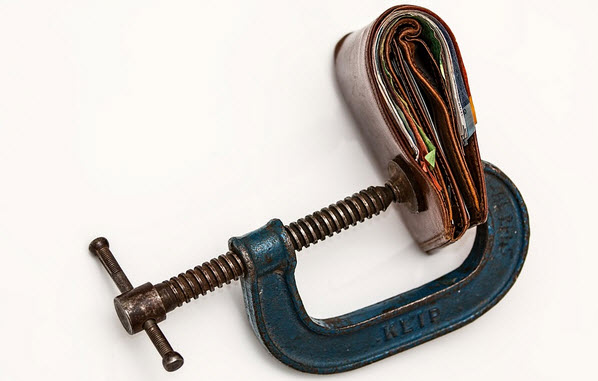
Happy New Year Isaved5k readers. Welcome to the first post (second post if you count my giveaway post) of 2017 and I hope that you’ve had a great holiday and are ready to jump-start 2017 with a bang. I am happy that you are here, which means you are interested in having a healthy start to your year – physically and financially. If you’ve missed the first part of this guide, I’d definitely recommend that you also review that post too as you’ll get more out of this topic if you read both. So without further delays, let’s get the show on the road shall we?

Debt management
When it comes to debt, not a lot of people are willingly or openly talking about it. It’s okay, we don’t have to share with others the amount of debt that we carry on our personal balance sheet. However, to be financially fit, we need to manage debt wisely and have it working for us, rather than us working to pay it off.
The first rule of being financially fit is: if you cannot pay your credit card bills or any high-interest department store bills in full and every month, you should be using cash to pay for your purchases instead. It’s not worth the points or cash back rewards if you are paying 20% or more in interest to carry a balance and the maximum that you can get back is about 1% to 4% in rewards for most cards out there. With simple math, you are actually rewarding the card provider with a juicy 16% or more return on your hard earned money.
The second rule is: only borrow to build wealth for yourself, not for others. What I meant by that is to borrow money to buy assets that increase the opportunity to build your net worth. For example, borrow money to buy a primary residence, or a vehicle to help expand your business or computer equipment to help you make money online rather than borrowing for consumption like a lavish vacation, or that 80-inch flat screen TV in your living room. If you follow these two rules, you’ll have a decent handle on your debt.
For those that are financially sound and are interested in having debt working for them, they can check out my post on how I get paid when borrowing money from the bank to further investigate if borrowing to invest is something that they would like to pursue.

Have a workout buddy
For most people, at some point in our lives, we will find a partner that we want to spend the rest of our lives with. If you are taking life’s journey together and your finances are intertwine, then why not manage your finances together?
I sometimes hear that some couples don’t talk about money at all or they don’t know what their other half is doing with their money. What’s even more alarming is that some couples even go their separate ways due to financial issues. To be financially fit as a couple, you can take the same approach as a physically fit couple – become financial workout buddies.
All the benefits that apply to physical workout buddies also apply to financial workout buddies. For example, you have someone to share your success with, help you when you need support, motivate you when you’re slacking, and share workout tips on how to get better results. Also, two heads are better than one. To get you started, I highly recommend this best-selling, “Smart Couples Finish Rich” book by David Bach.

Join a financial fitness class
When I joined the gym, I knew that I wanted to be in better physical shape. However, I had no idea on how I can get the most out of my gym membership and what type of workout routines or regiments that I should follow. One day, I discovered that there are many classes that I can join. There are freecycling, weight training, cardio, and yoga classes.
All these classes have at least one instructor that specializes in that area and will provide you with instructions on how to get the most out of their classes. I tried most of these classes and I settled with the classes that fit my personal needs. I guess by now, you probably know where I am going to go with this. The same applies to your financial fitness.
There are financial fitness classes that you can try on the internet to see which one fits you best. Below is a list of financial fitness instructors that I personally follow myself. You can give them a try to see which class(es) fit you best:
Internet Financial Fitness Classes
Canadian Budget Binder – He’s from the UK and a permanent resident in Canada and he love his life in Ontario, Canada. He bought my first house at the age of 21 then my second at the age of 24. He’s always been fascinated with personal finance, learning to make money and watch it grow while combating debts along the way.
Give Me Back My Five Bucks – Krystal Yee, a personal finance blogger and marketing professional based in Vancouver. She’s a former Toronto Star (Moneyville) columnist, author of The Beginner’s Guide to Saving and Investing, and co-founder of the Canadian Personal Finance Conference. She’s a master budgeter too. If budgeting is your thing, then she’s definitely the blogger to follow.
Million Dollar Journey – FugalTrader, a married Canadian (with 2 young children) who was born, raised and currently resides in Eastern Canada. He began investing in mutual funds when he was 16 years old and the passion for finance grew from there. When he graduated from University (he was 23), he started getting more serious about the stock market and real estate investing.
Mustard Seed Money – Mustard Seed Money stems from a passage in the Bible. In Mark 4:30-32, Jesus speaks of the smallest seed, a grain of mustard seed. Once sown, it grows and becomes one of the largest plants in the garden. His hope is that through your financial journey, that your small investment in time, money and faith will grow beyond anything that you could ever imagine.
Wallet Hacks – Jim Wang is a thirty-something father of two who has been featured in the New York Times, Baltimore Sun, Entrepreneur, and Marketplace Money. He can show you the philosophies, strategies, and methods he used to become financially independent and free to pursue what was important.
I saved $5K – Hopefully, I’d qualify to be your instructor in your financial fitness class. To read my bio just go to my mugshot at the end of the post or click on the about us page.

Understanding the basic tax rules
If you’ve been reading my blog, you know that I can’t talk about finance without talking about income taxes (I’ve got a personal crush on income taxes, don’t tell the Canadian Revenue Agency – CRA, they might be jealous). The reason behind it is that income taxes is a fact of life, regardless if you like it or not.
If that’s the case, why don’t we tame this terrible beast and have it working for us? The bad side of this beast is the more you earn, the more you pay. The good side is that there are quite a few tax deductions that can help you pay less taxes if you save diligently, like the Registered Retirement Savings Plan (RRSP).
There are incentives like free matching grants if you contribute to your kid(s) Registered Education Savings Plan (RESP). There is preferential tax treatment of Canadian eligible dividend incomes and capital gains. You don’t need to know all the rules. You only need to know the ones that benefit you the most and just read more about it or bring it up to your accountant’s attention when you are filing your income taxes.
By taking advantage of just the RRSP and RESP rules, I turned my savings from $12,000 to $20,500. Once again, you can see how I did it in the post where I made a 72% return on my savings. The important thing to remember about overall financial fitness is that it’s not just about maximizing savings, paying off debts or making high returns on your investments. It’s about optimizing and balancing the efficiency of those items so that you pay less taxes and keep more of your hard-earned money.
The bottom line is, “It’s not how much you earned, it’s how much of your earnings that you get to keep after taxes.” Check out the TaxTips.ca site to find out the list of deductions that applies to you.

Setting your own reward system
To keep myself motivated, I set up a reward system to give myself an energy boost whenever I feel that I am losing motivation or burning out. With any endeavor, no matter how committed or disciplined that you are, there will be times that you may feel that it’s tough to get over that hump.
To circumvent that situation, I allow myself splurge once in a while. For example, to motivate myself and my buddy to keep our rental operation running smoothly and keep up with all the maintenance work, we go out and have a nice meal once in a while (mostly after we completed some maintenance work at the property). That’s our way giving ourselves a big pat on the back for being on top of things. These get together are often very productive as we had time to catch up, review our operations and plan our next move to keep our operation running smoothly and competitively. Most importantly, it provided us with the rejuvenated feeling that we can do better in the future and drive us to conquer the next obstacle.

Financial fitness assessment
When you are training for a marathon or half marathon, wouldn’t you actually go out to the street or trail to a least run a few kilometers to assess if you are comfortable covering part of the distance without huffing and puffing? This way, you can at least assess if you have done enough training, or can run the full distance, or be able to complete the race within the targeted time.
For your financial fitness assessment, you can do a net worth calculation on a quarterly or annual basis. Your net worth calculation will give you a snapshot of your financial health at a point in time and if you have done a few, you can compare your current net worth with a year ago or two years ago. Hopefully, the trend is up. If it’s not, then you need to see which area of your net worth equation that you need to work on (Remember: Net Worth = Total Assets – Total Debts).
If you want to know how I do my financial fitness assessment, check out my 2016 year end performance review post.
My two cents
Your financial health is just as important as your physical health and can be managed in similar ways. You can’t be physically fit nor financially fit overnight. It takes time and effort to explore and find the right methods and routines that fit your own lifestyle and needs. Don’t just do something for the sake of doing it or you know someone who is doing it. Regardless of the physical or financial situation that you are currently in, there is always something that you can improve upon. Just keep an open mind, set goals for yourself, stay disciplined and motivate yourself, and one day you will achieve good health. Physically and financially.
That’s quite a lot of talking and not enough walking. It’s time that I hit the gym and you should too. To warm up, you can do some finger exercise by typing in your comments below and subscribe to my blog. 🙂


 About Leo
About Leo
I definitely agree with the long term motivation factor sometimes can be a difficult challenge. Every day we are bombarded with all kinds of advertising and deals, if we don’t pay attention for a couple of months, things can get out of hands pretty quickly and we will be spending more money than we make.
In order to keep my saving discipline for the long run and stay motivated, I need a reward system to keep me going. From time to time, I give myself a little treat to trick the kid inside me that I will be rewarded if I keep up with my good behaviour.
thank you Leo for your post… i’m a close follower of your blog and looking forward for your next post… you’re absolutely correct in the first paragraph of your blog: “…ready to jump start 2017 with a bang”… 🙂 the market did jump start with a bang , both Dow Jones and the TSX rise as of Jan 3rd, happy investing…!!!
@Minh
Thank you for the shout out. On the financial front, it definitely started with a bang and hopefully I can say the same on the physical front. Time will tell.
Thanks for the shout out Leo!!! I totally agree with that financial health and physical health are interlocked. Plus what good is it to be rich if you’re too sick to enjoy the money. With that said I can’t wait to go to my noon bootcamp tomorrow. 🙂
Right back at ya MSM.
I have been quite healthy for most of my life until last year when I started to have ankle pain. It never went away and it has been affecting me on a daily basis. One of the reasons for writing this post is to remind my readers that it’s important to balance both your physical and financial health. Can’t have one without the other.
Wow, what an interesting and creative way to build your net worth. I’ve not been a huge fan of debt and tried to keep it to an minimum, but with a different view, debt can be a positive thing if I manage it prudently. Thanks for sharing your thoughts.
That’s right. If you are comfortable managing your debt and you are disciplined, then debt can be a great tool for you to build your net worth. As long as you borrow for investment rather than for consumption, having some dept on your personal balance sheet can give you a lot of benefits.
Thank you so much for sharing this post I really need a financial advice right now. I really want to save money and invest into something that will be fruitful someday.
Hi Mariel,
My financial advice for any that are interested to build a secure and financial future for him/herself is to first invest in oneself by expanding one’s financial knowledge. Once you learned how to manage your money, then you can have your money working for you.